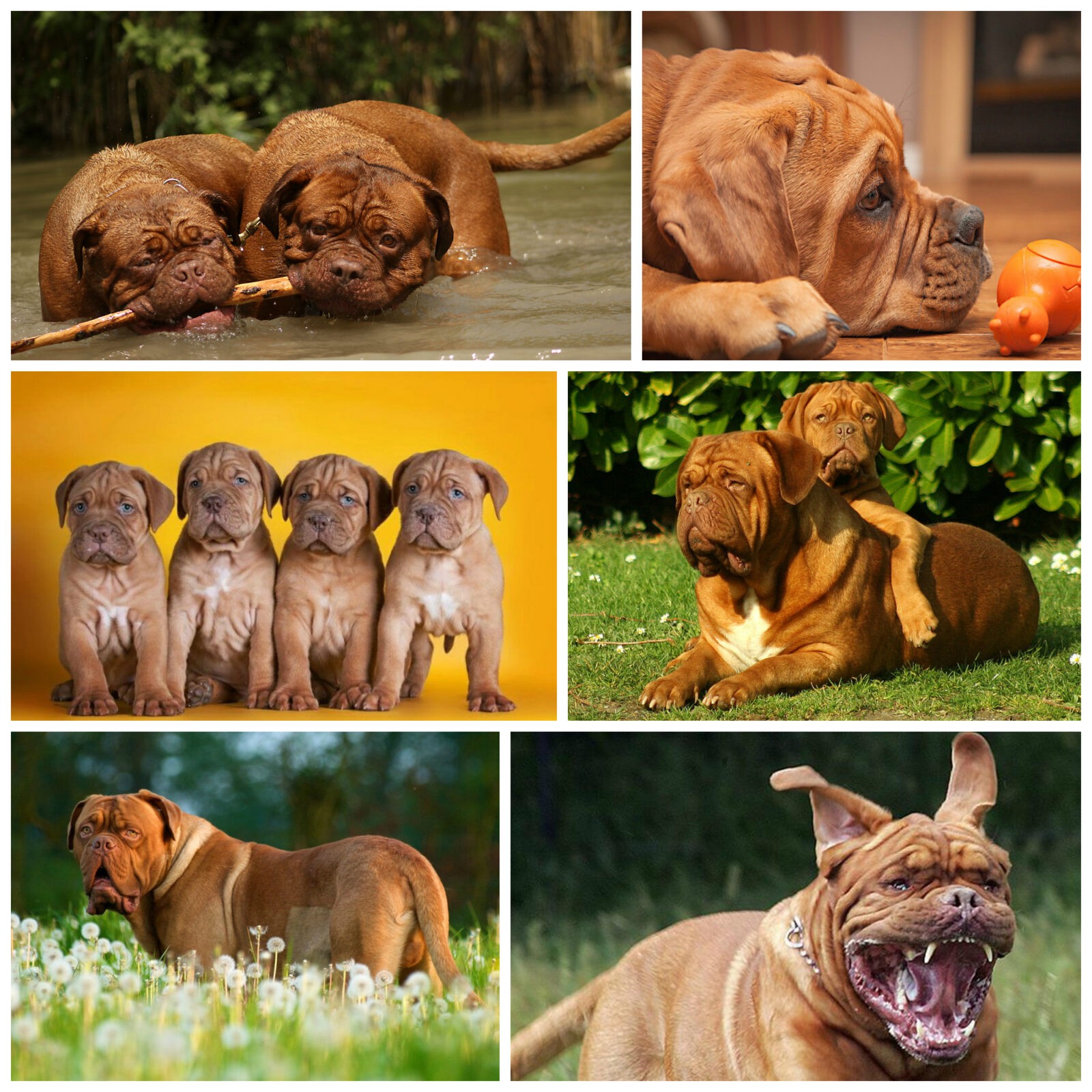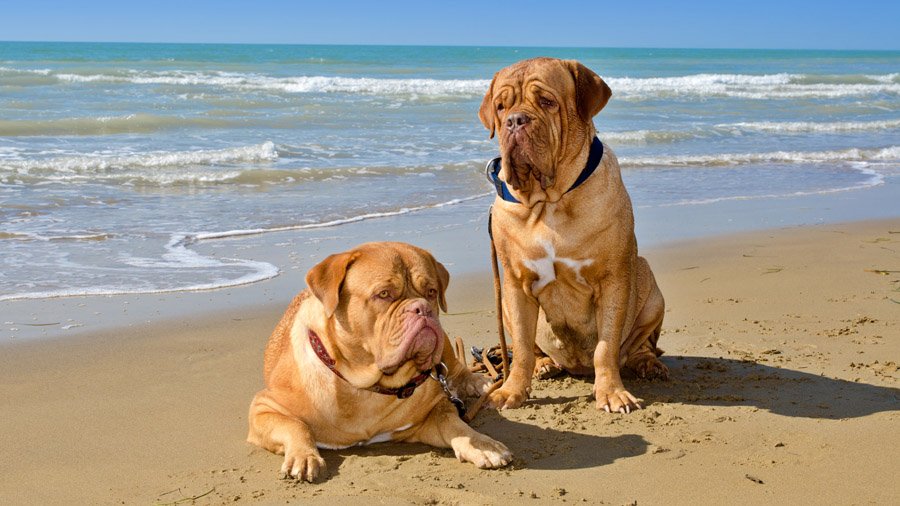The Dogue de Bordeaux is a calm and gentle dog, which, at the same time, is stubborn. Dogs of this breed drool, and they also have a hard time with temperature changes.
Brief description of the breed
Many people first learned about the existence of such an interesting breed in 1989. This happened thanks to a picture released this year called "Turner and Hooch" with Tom Hanks in the title role. Since then, the popularity of the breed began to grow rapidly. This dog almost immediately won the hearts of thousands of people.
The Dogue de Bordeaux is a relative of the Mastiff. He has a large head, a very muscular body, a wrinkled muzzle, which is probably the very feature that makes people recognize the Dogue de Bordeaux. These dogs have a fighting history, but today all members of the breed are excellent companion dogs.
The Dogue de Bordeaux is a vigilant and courageous dog. This dog is very loving and devoted to its owner. If you have not been engaged in dog breeding before, then you should not choose this breed. There is a high probability that keeping and training such a large dog will be a burden to you. The dog is strong and stubborn. Its owner must have unconditional leadership qualities. Early socialization is a must for the Dogue de Bordeaux. Otherwise, the animal may become aggressive and difficult to control.
Dogs of this breed do not belong to those that can be put on a chain. The Dogue de Bordeaux loves his family and wants to be always with her. Therefore, be prepared to share not only the common living space with your pet, but also your own sofa.
Anatomical anomalies in the development of the respiratory organs are often observed in dogs of this breed. That is why the Bordeaux dogs often suffer from shortness of breath. The air in the house should be sufficiently cooled, and it is better to forget about walks on hot days if you do not want to harm your pet.
These large dogs are not particularly active. You can even say more: they are real sloths, who love to spend time quietly napping at the feet of the owner, and being distracted only by eating and short walks in the fresh air.
In relations with young children, this Great Dane is very affectionate and friendly. The calm nature of the dog suggests that it is unlikely to harm your baby. So in this regard, you can be absolutely calm. But do not forget that a child should not be left alone with a dog, regardless of its breed and size.
The Dogue de Bordeaux also gets along well with cats and other pets, but, however, on the condition that he was brought up surrounded by these pets from childhood.
basic information
| Breed name: | Dogue de Bordeaux |
| Country of origin: | France |
| The time of the birth of the breed: | XIV century |
| Type of: | Molossians |
| The weight: | 45 - 55 kg |
| Height (height at the withers): | 58 - 68 cm |
| Life Expectancy: | 5 – 10 years |
|
ICF classification:
|
Group 2, Section 2, Number 116 |
| Puppies price: | 450 – 2150 $ |
| Most popular nicknames: | list of nicknames for the Dogue de Bordeaux |
Evaluation of the characteristics of the breed Dogue de Bordeaux
| Adaptability
(a definition meaning how easily a dog can adapt to changes in life) |
🐶🐶🐶 |
| Shedding level
(Level and frequency of hair loss in the animal) |
🐶🐶🐶 |
| Tenderness level
(The level and amount of tenderness and affection that the dog gives in return for attention to itself) |
🐶🐶🐶🐶🐶 |
| Exercise needs
(Dog's daytime activity level) |
🐶🐶 |
| Social need
(The required number of contacts of the dog with other animals, as well as people) |
🐶🐶🐶🐶 |
| Apartment content
(A factor that determines the level of noise and other inconveniences that a dog can deliver to owners in relation to the size of the apartment to the size of the dog) |
🐶 |
| Grooming
(The number of bathing, brushing, and the number of professional grooming sessions required for the dog) |
🐶🐶🐶🐶 |
| Friendliness in an unfamiliar environment
(Features of the behavior of a dog in a society with strangers or in an unfamiliar environment) |
🐶 |
| Tendency to bark
(Tendency to bark and its frequency and volume) |
🐶🐶 |
| Health issues
(Potential health status of the dog) |
🐶🐶🐶🐶🐶 |
| Territoriality
(The dog's tendency to protect his home, yard, or even his owner's car) |
🐶🐶🐶🐶🐶 |
| Friendliness to cats
(The tendency towards tolerance for cats and decreased manifestation of hunting instincts) |
🐶🐶🐶 |
| Intelligence
(The ability of the dog to think and solve emerging difficulties (not to be confused with learning!) |
🐶🐶🐶 |
| Education and training
(The level of difficulty in training the dog to perform certain actions) |
🐶🐶🐶 |
| Friendliness to children
(A factor that determines how friendly a dog is to children, whether he likes to play with them and tolerate some childish pranks) |
🐶🐶🐶 |
| Game activity
(The concept is determined by its very name, and, as a rule, is found in almost all dogs) |
🐶🐶 |
| Observation
(The ability of a dog to detect the presence of a stranger on its territory) |
🐶🐶🐶🐶🐶 |
| Friendliness to other dogs
(The tendency of the dog to find common language with his other relatives) |
🐶🐶 |
Dogue de Bordeaux photo:

Origin of the Dogue de Bordeaux
Personality of the Dogue de Bordeaux
The Dogue de Bordeaux is a serious, self-confident dog, distinguished by vigilance and courage. Representatives of this breed are excellent companion dogs. They are very sociable and friendly.
Dogues de Bordeaux are calm and intelligent, however, sometimes they can be stubborn. By the way, the stubbornness of such a dog is quite difficult to deal with. That is why early socialization is necessary, which must be carried out by the owner with strong leadership qualities. Otherwise, the pet may be aggressive towards other dogs, small animals, and even people. If you decide to get a Dogue de Bordeaux, you must be prepared to work hard with the dog in order to earn its respect.
This breed is an excellent family dog. They love to spend time with their family, including lounging on the couch with their owner or just sleeping in the sun in the yard. Despite the fact that the Bordeaux dogs give the impression of calm dogs, at the first danger they are ready to come to the defense of their master.
Maintenance and care
Since the Dogue de Bordeaux has a short coat, it is very easy to care for it. It is enough to brush your pet once a week with a rubber brush to get rid of dead hairs. During the molting period, this should be done more often.
Worth paying attention. That the Dogue de Bordeaux has skin folds that need special care. They must be thoroughly wiped with a damp cloth or damp cloth, and then thoroughly wiped dry. This will prevent skin infections.
Get in the habit of carrying a small towel or tissue with you to wipe your dog's face after eating or drinking. It should be noted that when the Great Dane swings his head, drool can scatter in all directions.
Dogue de Bordeaux are prone to heavy molting. You will often have to sweep and vacuum the house in order to remove the hair that has fallen out during heavy shedding. Check your ears weekly for infections or irritations. Brush your dog's teeth as often as possible and trim your nails regularly.
Training and education
Health and disease
Some interesting facts
- The Dogue de Bordeaux is a direct relative of the mastiff.
- The Dogue de Bordeaux originated in France.
- Dogue de Bordeaux gets along well with cats and others dogswith whom he grew up since childhood. At the same time, having met someone else's cat on the street, most likely, this giant will chase her. Blame it all - the innate hunting instinct.
- The thick skin of the dog is covered with very short hair. The coat itself can be any shade from light fawn to dark red, with or without a black mask.
Nurseries and breeders
We borrowed material from the wonderful site of our partners DOGCATFAN.COM about cats and dogs, the author dogcatfan

